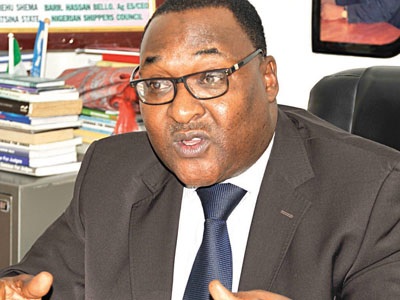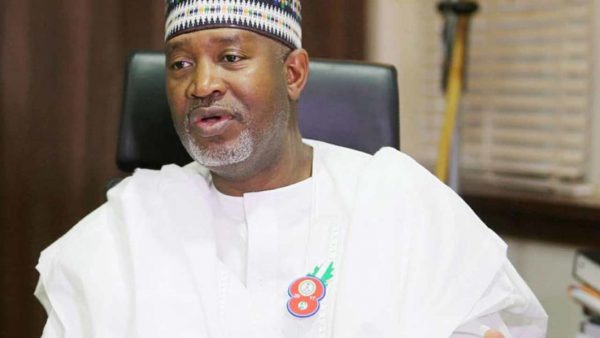How Nigeria Can Become A Maritime Hub In Africa- Hassan Bello

Following the reappointment of Mr. Hassan Bello as the Executive Secretary of Nigerian Shippers’ Council (NSC), he sat with MMS Plus to recount his experience in the last four years and sets his agenda for the Nigerian ports and transportation at large in the next four years. Enjoy it:
Shippers’ Council has been at the forefront of creating a Standard Operating Procedure for every stakeholder at the ports. Hitherto, nobody knew what the other agencies were doing but now we have collaborated with other agencies to devise a Standard Operating Procedure (SOP) for almost all the agencies at the ports; shipping companies, the terminal operators, Customs, Nigerian Ports Authority (NPA), Nigerian Agricultural Quarantine Service (NAQS), National Drug Law Enforcement Agency (NDLEA), Standards Organization of Nigeria (SON) and almost every agency.
So, we are working with the Independent Corrupt Practices and other related offences Commission (ICPC) to ensure that these SOPs are not only known to everybody but also enforced. This should mark the beginning of orderliness at the ports. You would have noticed that we have brought so many agencies here. NAQS came here (to Shippers’ Council) last week; we also spoke with the Federal Road Safety Corps (FRSC). We are all looking at the procedures of how you operate at the ports and make sure that it is in accordance with what obtains all over the world. This is to showcase our efficiency, transparency and ease of doing business.
This is just the first step. The Nigerian Shippers Council has also devised the Ports Support Service Portal (PSSP) which is an online complaint procedure now and we are getting responses. All agencies are sending two persons who are the officers and their profile through which complains of every agency would be certified. If you have a complain, you just go through the portal. This is going to be surrendered to the industry for transparency, effectiveness and efficiency.
Again, we are working with the shipping companies to bring out a veritable and sustainable tariff mechanism. You would have known about the case in court which has been decided by the court of appeal. Even before the court of appeal, we don’t begrudge the operators from going to court after all, everybody wants a definition but what is most important is that we are forging ahead and we want to establish a sustainable mechanism of settling disputes including negotiations on tariff. We are consulting stakeholders and the government in this regard and very soon the prices at the ports will not only be regularized but be transparent and it is the tariff that is been negotiated by the Council.
We are also focusing on the ease of doing business. We cannot go on without openness in our port industry. We demand and we will receive transparency and openness. There has been a little hitch about the cargo tracking note but that is been pursued now. Ultimately, we are also part of the national single window. So, if we entrench all these which will soon be done, I assure you that Nigerian ports will be world standard, they would be efficient, productive and competitive. As it is now, the most important thing is to get more cargoes from our competitors.
The Federal Ministry of Transportation is pushing for the infrastructure and the economy is driven by transport. We must have modern infrastructure. I know the deficit is a bit frightening but if we are determined, we can slowly reduce the deficit. One of the issues we are handling is dry ports. We have started up the Kaduna Dry Port and through that we are bringing shipping to the door step of shippers and creating other industries in Kaduna. We are also making these dry port locations new bases for export, which means that we are diversifying the nation’s economy. We are looking at Jos which is about 65% completed and Jos has already got contracts. When these ports kick-off fully, you would see that we don’t have to keep cargoes at the seaports. We are working with the shippers, terminal operators and other stakeholders to make sure that this initiative works. The construction at Isiala Ngwa would soon begin and they have 18 months to complete it. We also have a truck transit park (TTP) which we are also promoting via Public-Private Partnerships (PPP). We have advertised and there have been tremendous support.
The beauty of all these is that they are all connected. You cannot have infrastructure that is not connected to the ports, i.e. seaports and you also have to be concerned about what is happening at the TTPs and the Dry Ports. We need such integrated infrastructure for seamless transport systems. The issue is that at any time, somebody at the seaport, for instance a shipping company or a freight forwarder would know the space available at a TTP and send a truck there. TTP is modern facility that would have hotels, hospitals, police stations, petrol stations, mechanic workshops, etc., to enable us take the trucks off the highways and we have the FRSC to enforce compliance. TTP is also a cash-cow and it has employment opportunities. We expect each of the TTP to create about 1000 to 1500 jobs that is direct employment because the Ministry of Transport wants us to look into the employment context of every infrastructure that we are doing. The railway is also coming up and the moment that is achieved, you would see that the economy of Nigeria has no other way to go but up. So, in two or three year’s time, you would see that Nigeria is transport driven economy. This is our dream and although it is not an easy task, we have tremendous support from stakeholders at the various levels as well as the Transport Ministry. We are also in the Presidential Ease of doing Business Council (PEBEC) under the leadership of the Vice President, Prof Yemi Osinbajo who wants to ensure that we promote transparency.
The Council has also been included in two very important committees at the Central Bank of Nigeria (CBN). They are the Export Scheme and also the Import Scheme. These are key to the economy of this country. Again, the House of Representatives has passed the National Transport Commission (NTC) bill and they recommended that Shippers’ Council should be the pivot upon which the NTC evolves. So, we are also expecting more enabling powers to carry out our regulatory duties.
It is true that we have been in court with Shipping Lines and Terminal operators but we have also had productive meetings. Shippers’ Council is neutral; we have to look at the Shippers and also carter for the operators; the users and the providers of shipping services. We are the referee or the umpire in a tennis game. We have tremendous co-operations with all the port agencies especially, the Customs. We work together on the Dry Ports, because they are going to be present as the ports would be ports of origin and destination. We want a transport system that would drive the economy because the economy rests on transportation. We are aware of the need for diversification of the economy but no matter how much you diversify, if you don’t have effective modern transport infrastructure, then you may have problems.
Look at agriculture, we don’t only want Nigeria to reduce the dependence on oil but also to be an export oriented economy. We are cooperating with Nigerian Export-Import (NEXIM) bank, the Nigerian Export Promotion Council (NEPC), among others to ensure that there is access to funds and the requisite infrastructure to support exports are available.
These institutions are planning to have a breakfast meeting with the Nigerian Stock Exchange and other stakeholders on how to go about funding for TTPs. We have got several offers. We have got land donated to the Shippers’ Council by the state governments in Enugu and Jos. We are going to ensure that there would be modern facilities and all the trucks can be tracked are they transit to the facility. We wouldn’t have rickety trucks anymore because we are planning with the National Automotive Council to re-fleet these trucks. On the development of TTPs, we have met with Nigerian Association of Road Transport Owners (NARTO), Association of Maritime Truck Owners (AMATO), Road Transport Employers Association of Nigeria (RTEAN), and they are all in sync with our plans. We are slowly assuming that role to intercede for the government to ensure a better transportation some but there are several challenges and we have to work with sister agencies.
One of the major problems in Nigeria is the lack of synergy amongst government organizations but the moment we bring automation to the ports, that is the end of that problem. Automation is the light that would throw away the darkness as all organizations that argue that they have to be at the ports would realize that they can operate from their offices. We believe that in the next four of five years, history would` be written that Nigerian ports are the preferred destination in the West and Central African Sub-region. In otherwords, Nigeria would be the hub of maritime activities that we have always longed for.







